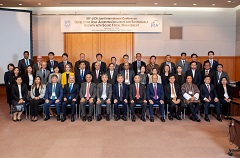- Home
- News & Features
- Press Releases
- FY2019
- Achieving Inclusive and Sustainable Growth with Sound Fiscal management in Asia: A Conference Jointly Organized by JICA and the IMF
Press Releases
February 14, 2020
Achieving Inclusive and Sustainable Growth with Sound Fiscal management in Asia: A Conference Jointly Organized by JICA and the IMF
 Participants
Participants
On Feb. 13 at the JICA Ichigaya Building (Shinjuku, Tokyo), the Japan International Cooperation Agency (JICA) and the International Monetary Fund (IMF) held a joint international conference on “Developing Asia: Achieving Inclusive and Sustainable Growth with Sound Fiscal Management.”
1. Conference summary
This fifth international conference was the first time in three years, with 22 high-level participants including finance ministers and central bank governors from 12 Asian nations. Participants discussed initiatives and challenges in achieving Sustainable Development Goals (SDGs) with due consideration of investments and debt management.
Ministry of Finance Vice Minister for International Affairs of Japan Yoshiki Takeuchi, in his keynote address, pointed out that in addition to quality infrastructure investment and universal health coverage (UHC) (*1), management of debt sustainability and transparency were important aspects of inclusive and sustainable growth.
2. Achieving SDGs: Approach to costs and sustainability
In order to achieve SDGs in the areas of education, health and infrastructure, the IMF shared their analysis that low-income economies need to increase annual expenditure by 15.4 percent of gross domestic product (GDP), and that developing countries need to increase spending by 4.1 percent of GDP by 2030. In order to achieve this, they suggested initiatives to increase income and improve spending efficiency as well as effective use of private funds and international development finance institution’s funds.
JICA looked back over the U.N. High-Level Meeting on UHC held last year and the G20 Finance and Health Minister’s Meeting as a way to introduce the challenges and initiatives in achieving UHC, as an integral part of SDGs. JICA also mentioned investment in UHC as a foundation for inclusive economic growth and reported on the importance of coordination between finance and health ministries in order to achieve such an objective.
3. Sustainable growth, sustainable finances and debt
During the first half of the conference, the IMF reported on the importance of public debt management and revenue mobilization, reduction and exemption of tariffs in order to promote private participation, and deregulation with the example of striking growth in Southeast Asia in mind. JICA pointed out the importance of transportation infrastructure that promotes connectivity within the country and region for development in Southeast Asia based on the result of the joint research with the World Bank and ADB, etc. Along with political commitment, JICA also brought up the importance of verifying the positives and negatives of wider economic effects as well as prioritizing targets.
During the second half of the conference, participants discussed public finance management reforms, with JICA reporting on the strong need for public investment in developing countries, and further attention on public investment management (PIM) (*2) from the viewpoint of quality infrastructure investment. JICA also introduced PIM support efforts that have been ongoing as part of Technical Cooperation since 2000 in Laos and Malawi. The IMF explained the current situation of public finance reforms in Asia, shared and referred the lessons learned from the past projects.
This conference proved to be an extremely meaningful opportunity for discussion among partner countries in Asia, the IMF, which supports macroeconomic policy, and JICA, which supports the growth and development of real economic activity including the micro level. In particular, as the financial need to achieve SDGs and invest in infrastructure is increasing, the conference helped participants more deeply understand initiatives of the IMF and JICA in public finance including debt management. In collaboration with other organizations such as the IMF, JICA will continue to support, through peer-to-peer discussions based on empirical studies, the realization of inclusive and sustainable growth in Asia.
(*1) Universal Health Coverage (UHC): Provision of appropriate health promotion, prevention, treatment and functional recovery services at an affordable price for all people.
(*2) Public Investment Management (PIM): Management of expenditures by the government for public infrastructure such as economic and social infrastructure.
- About JICA
- News & Features
- Countries & Regions
- Our Work
- Thematic Issues
- Types of Assistance
- Partnerships with Other Development Partners
- Climate Change / Environmental and Social Considerations
- Evaluations
- Compliance and Anti-corruption
- Science and Technology Cooperation on Global Issues
- Research
- JICA Development Studies Program / JICA Chair
- Support for the Acceptance of Foreign HRs / Multicultural and Inclusive Community
- Publications
- Investor Relations





